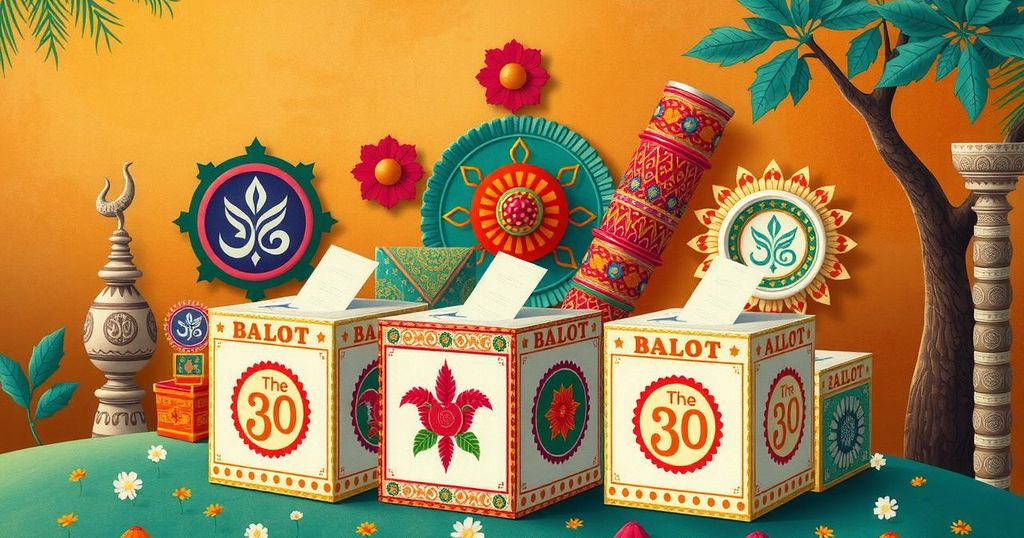World news
2024 ELECTIONS, ASIA, BANGLADESH, BANGLADESH BUREAU OF STATISTICS, BARACK OBAMA, BIHAR, DEMOGRAPHICS, ELECTIONS, EMMANUEL MACRON, EUROPE, FRANCE, IAN, INDIA, INDIAN NATIONAL CONGRESS, LABOUR PARTY, NEW DELHI, NORTH AMERICA, PUBLIC SERVICE, RU, RUDRA MUKHERJEE, UK, UNITED KINGDOM, UNITED STATES, VOTER TURNOUT, VOTING INTENTIONS, WEST BENGAL
Sofia Rodriguez
0 Comments
Hindu Voters as a Decisive Factor in Bangladesh Elections
Hindu voters in Bangladesh, constituting around eight percent of the population, are increasingly significant in shaping election outcomes. Their historical backing of the Awami League is challenged by recent incidents of persecution and discontent. Alternative political parties are now attempting to attract Hindu support, recognizing its electoral importance as the nation approaches upcoming elections in December.
In democratic societies, minority voters significantly influence electoral outcomes, particularly when they represent between five and fifteen percent of the electorate. This trend is observable in various countries, including the United States, France, India, and the United Kingdom, where such voters can determine which political party ascends to power. Their preferences often shape critical electoral results, demonstrating their vital role in the democratic process.
In the United States, a diverse array of minority voters, including African Americans and Latinos, represents nearly thirty percent of the electorate. Their collective support helped secure Barack Obama’s victories in both 2008 and 2012. Similarly, in India, where approximately fifteen percent of the populace consists of minority voters, their preferences are especially potent in states like Bihar and West Bengal, significantly impacting parties such as the Indian National Congress and the Trinamool Congress. The United Kingdom also witnesses the influence of minorities, comprising around fourteen percent of the population, historically supporting the Labour Party. France’s Muslim minority, accounting for about nine percent, plays a critical role in presidential elections, highlighting how minority voters can affect key political events globally.
In Bangladesh, Hindu voters hold a substantial position in influencing election outcomes, having historically contributed to national electoral processes. Presently, Hindus represent around eight percent of the Bangladeshi population or approximately 13 million individuals. Although their proportion has declined over the past five decades—from 13.5 percent in 1974 to 7.95 percent in 2022—the absolute numbers have increased from 9.6 million in 1974 to 13.5 million in 2022, as reported by the Bangladesh Bureau of Statistics.
Traditionally, the Awami League party has garnered significant Hindu support, being perceived as a pro-secularism and minority rights party. Despite this, there have been incidents of Hindu persecution and communal violence during its governance. The Awami League’s commitment to secularism and minority welfare has been a cornerstone of its political platform since the Bangladesh Liberation War.
The dynamics of Hindu voting behavior are informed by various factors, including security and welfare. Parties seeking Hindu support must prioritize the safety of minority groups and address their economic and social concerns. Voter confidence can be notably influenced by local parliamentarians’ attitudes and the implementation of welfare policies for minorities.
Following the fall of the Awami League government in August of the previous year, Hindu communities experienced renewed persecution, with attacks on homes and businesses reminiscent of past communal violence. Historical election data illustrates that the Hindu electorate has played a crucial role in parliamentary elections, with their votes significantly impacting results between the Awami League and the Bangladesh Nationalist Party (BNP).
Hindu voters are particularly influential in 88 of Bangladesh’s 300 parliamentary constituencies, especially in regions where they constitute a higher percentage of the population. Although historically the Awami League has retained an advantage among Hindu voters, a rise in incidents of persecution has fostered discontent within the community. This dissatisfaction has led to increased openness towards alternative political parties.
As the next national elections in Bangladesh are anticipated for December, political parties are actively gearing up to attract Hindu voters, who have become more organized in advocating for their rights. The heightened political consciousness among Hindus, coupled with the potential for genuine minority protection policies from any party, positions them as a “trump card” in the electoral landscape.
Despite the Awami League’s historical appeal, numerous incidents of violence against the Hindu community have eroded trust in the party. While the Constitution upholds secularism, the lack of specific protective legislation for minorities continues to pose a challenge. The persistence of outdated laws such as the ‘Vested Property Act,’ which enables the appropriation of Hindu land, exacerbates the community’s struggles for economic security.
In conclusion, the future of Hindu voters’ political alignment may hinge on which party convincingly demonstrates a commitment to ensuring security and equal rights for minorities. As the electoral process progresses, Hindu voters could serve as a decisive factor in shaping the outcomes of Bangladesh’s upcoming national elections.
The role of Hindu voters in Bangladesh’s electoral landscape is increasingly critical, especially in the context of their historical significance and recent experiences of persecution. Political parties aiming to secure Hindu support must focus on implementing genuine policies for minority rights and protections. With Hindu voters emerging as a potential “trump card” in the forthcoming elections, their influence may markedly affect parliamentary outcomes, serving as a bellwether for broader electoral trends in the country.
Original Source: www.awazthevoice.in




Post Comment